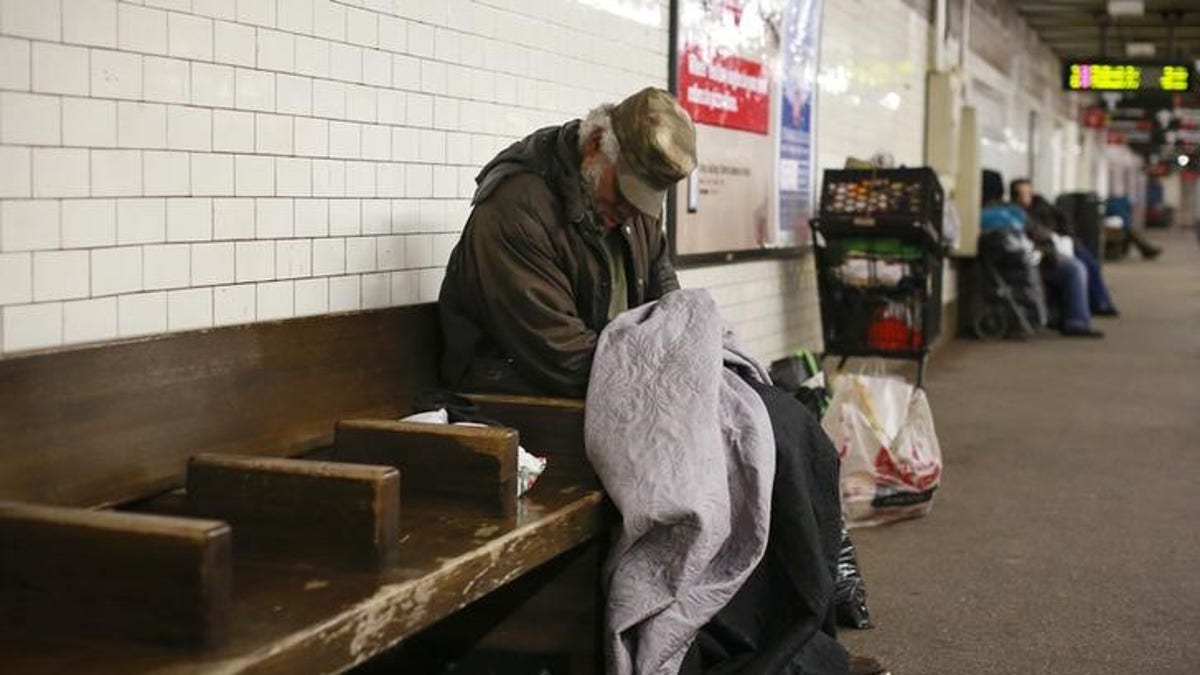
A man sleeps on a seat at the Borough Hall subway station in the Brooklyn borough of New York (Copyright Reuters 2016)
Health conditions usually seen among the elderly are more common among middle aged homeless people than older people with housing, according to a new study.
Those conditions include thinking problems, visual impairment, urinary incontinence and falls, write the researchers in The Gerontologist.
"I think in a sense this is a problem of severe poverty," said senior author Dr. Margot B. Kushel, of the University of California's San Francisco General Hospital.
Geriatric conditions occur earlier in life for people in poverty and even earlier in life for those who are homeless, Kushel told Reuters Health.
However, researchers didn't know how common these conditions were among homeless people, and if those rates varied by where homeless people stayed from time to time.
For the new study, researchers interviewed 350 people who are homeless and aged 50 and over. The participants stayed in unsheltered locations, shelters, intermittently with family or friends, or in rental housing. Half of the group was younger than age 59.
A third of the homeless group said they had suffered a fall over the past six months, a quarter had cognitive impairment, 45 percent had vision problems, and almost half screened positive for urinary incontinence, regardless of their living arrangements.
These issues typically first arise for housed adults age 75 and older, write the researchers.
The homeless participants had as much or more trouble bathing, dressing and eating, using transportation, taking medications, managing money, applying for benefits, arranging a job interview and finding a lawyer as 80 year olds with housing in the general population, they found.
"Some of these impairments come out because of a lifetime of poor access to healthcare, and potentially substance use disorders," Kushel said.
The rate of cognitive impairment was "astonishingly high," she said.
"In my mind that raises the question, did the cognitive impairment potentially lead to their homelessness," she said.
But homelessness itself, and the struggles or trauma that precede it, can have physical health effects and cause old age to express earlier, said Dr. Josh Bamberger, medical director for housing and urban health at the San Francisco Department of Public Health.
"One of the ways we handle geriatric conditions is we make changes to the environment, add grab bars in the bathroom, we light their path to the bathroom with nightlights to prevent a fall," Kushel said. "When people are in unstable environments, we can't do that."
More than 40 percent of the homeless group had not been homeless before age 50.
"That makes me fearful that cognitive impairment or physical limitation contributed to their homelessness," Kushel said. "It's already hard to fight an eviction notice, but if you're cognitively impaired or having difficulty walking, that only makes it harder."
"What we ask them to go through to leave homelessness, that includes cognitively and physically hard things," like taking public transportation to various offices and filling out paperwork, which may be too difficult for people suffering the health problems common to 80 year olds, she said.
Permanent supported housing may help prevent and treat some of these health problems, she said.
"There doesn't have to be any new allocation of funding, just repurposing of funding," said Bamberger, who was not part of the new study.
Most adults who become homeless first start utilizing the healthcare system more and more in emergency rooms, as inpatients or in nursing homes, he said. Repurposing those healthcare expenditures for housing has been done successfully in some U.S. cities and states, he told Reuters Health.
"We define housing as something other than healthcare but that's purely a theoretic definition," Bamberger said. "We can define things however we wish."








































